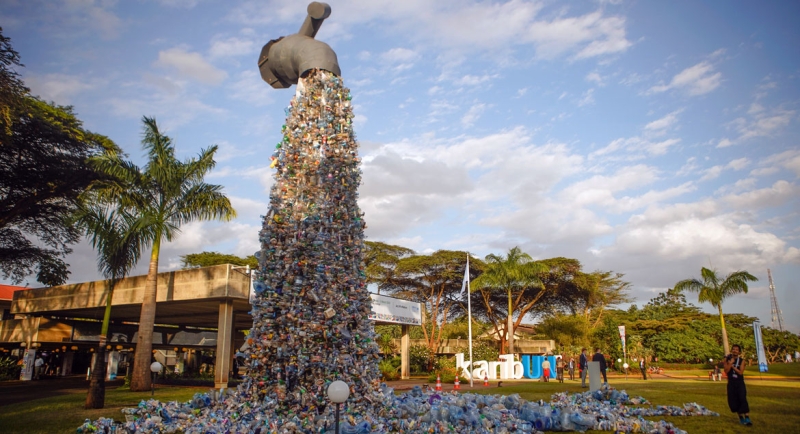
An installation dedicated to plastic pollution by Canadian activist and artist Benjamin von Wong has been installed outside the UN Environment Assembly in Nairobi, Kenya. Final round of talks on global plastic pollution agreement kicks off in South Korea Climate and Environment
The fifth and final round of talks on a legally binding agreement to combat plastic pollution kicked off in Busan, South Korea on Monday under the auspices of the United Nations Environment Programme (UNEP).
The meeting concludes two years of intergovernmental consultations aimed at developing a global instrument covering pollution on land and in the sea. Such rapid progress is an exception in diplomatic practice, where multilateral agreements often take decades to negotiate.
A Call to Action
“Our world is drowning in plastic waste. Every year, we produce 460 million tonnes of plastic, much of which quickly becomes litter,” UN Secretary-General António Guterres said in a video message to the meeting, stressing the need for urgent action.
“By 2050, there could be more plastic in the ocean than fish. “Microplastics in our blood are creating health problems that we are only beginning to understand,” he added.
Historic Agreement
UNEP Executive Director Inger Anderson expressed hope for a potentially historic agreement: “No one on the planet wants to see plastic waste under their windows or plastic particles in their bodies.”
She noted that all parties are actively involved in the negotiation process: from waste collectors and civil society activists to representatives of the business and financial sector.
“We have received clear signals that such an agreement is necessary. This is confirmed, for example, by the recent G20 declaration, where G20 leaders expressed their determination to conclude a treaty by the end of the year,” Anderson added.
Broad support
Representatives from more than 170 countries and more than 600 observer organizations have registered to attend the week-long talks in Busan. South Korean President Yoon Seok-yeol called on delegates to agree on ways to achieve zero plastic pollution.
“Humanity’s overreliance on the convenience of plastic has led to an exponential increase in plastic waste. “This waste, accumulated in our oceans and rivers, threatens the lives of future generations,” he said via video link.
“I hope that over the coming week all Member States will come together in solidarity, aware of their responsibility towards future generations, and finalize the treaty,” he added.
Final stage of negotiations
The official name of the process is the fifth session of the Intergovernmental Negotiating Committee to develop an international legally binding instrument on plastic pollution, including marine plastic pollution. This stage follows four previous rounds, the first of which began 1,000 days ago in Uruguay.
The UNEP chief stressed that “some plastics can take 1,000 years to decompose,” adding that even then they break down into small particles that continue to pollute the environment, harm ecosystems, block urban drainage systems and likely pose a threat to human health. Rising plastic pollution also fuels greenhouse gas emissions, accelerating climate catastrophe.
“That’s why public and political pressure for action has reached a fever pitch,” Anderson said.
A comprehensive approach
The UN Secretary-General said in his address that the agreement must cover the entire life cycle of plastic, including measures to reduce the use of single-use products, improve waste management and develop alternative materials. In addition, the treaty must provide for access by all countries to modern technologies, improve the quality of the terrestrial and marine environments and protect vulnerable communities, including those who earn a living from waste collection.
